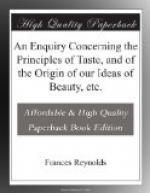Every object of taste has at least a double reference to mental pleasure, whether the object, in the philosophical scale of our perceptions, belongs to those of sense or intellect. Thus, the beauty of the rose would not certainly be so perceptible to us, wanting its fragrance, and, with a nauseous smell, would not probably be admitted, as I may say, into the rank of agreeableness, though it is in reality a beautiful and pleasing object; nor, supposing the thistle, or any other ugly flower, possessed of the fragrance of the rose, should we therefore think it an object of taste, any more than we can think the form of an elephant beautiful, though endued with almost intellectual beauty.
In the form and colour of flowers, there appears to me a striking analogy to the character of human beauty. They afford an ocular demonstration, in the pleasure with which we contemplate their particular forms, that the pleasure, we receive from the beauty of the human form, originates from mental character: witness the charm of the infant, innocence of the snow-drop, of the soft elegance of the hyacinth, &c. and, on the contrary, our dis-relish of the gaudy tulip, the robust, unmeaning, masculine, piony, hollyhock, &c. &c.
It is, I imagine, from a resemblance to some pre-conceived idea of beauty in the human species, that we are particularly pleased with the sight of one flower more than with another, though the mind is unconscious of the cause. And thus the pleasure, caused by the apparent beauty of every object throughout the system of human perception, is, according to my sentiment of that pleasure, the same intellectual principle, moral good, however diversified, modified, and diminished, even to an unconsciousness or almost imperceptible degree of relation to it. In fine, the true principles of beauty, in every object, may be all resolved into the same principle. But to conclude.
I have no more doubt that the principles of beauty are moral, than that the principles of happiness are moral. It is the perception of true beauty, in its various modifications, that makes up the sum of human happiness; and hence the diversity of opinions concerning beauty, but which, however diverse, are never contradictory, but as mens opinions in morals are so; for every view of beauty assimilates with some good, and of course must be in unison.
If, in the human system, there exists a principle which constitutes true pleasure, that principle must be that which constitutes human excellence; and, if the visible object which excites true pleasure must necessarily possess the principles of true pleasure, then must every object, which universally and invariably pleases, be relative to the principle that constitutes human excellence, morality.
Whatever appears, to each individual, the most excellent in the human system, at once constitutes his idea of happiness, of morality, and of beauty; and all mankind, I imagine, would agree in the same idea, had all the same opportunities of seeing and knowing what was excellent.




